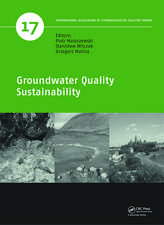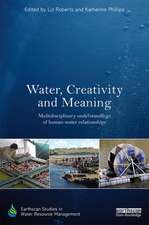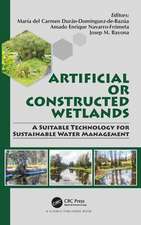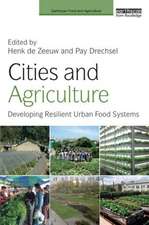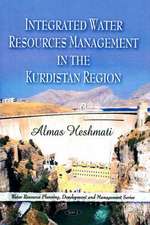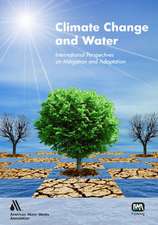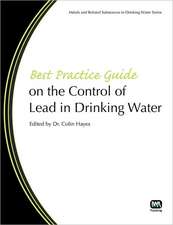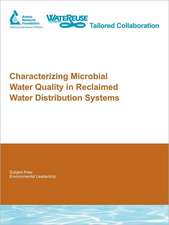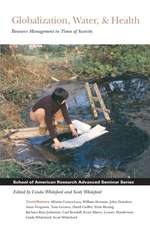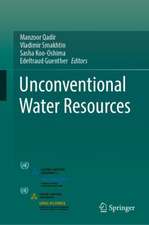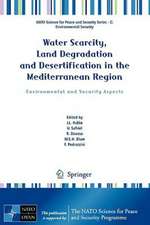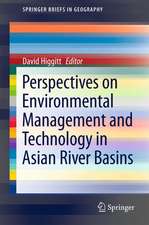Wastewater: Economic Asset in an Urbanizing World
Editat de Pay Drechsel, Manzoor Qadir, Dennis Wichelnsen Limba Engleză Hardback – 26 mar 2015
“It requires business thinking to transform septage and sewage into valuable products. A must read for water scholars, policy makers, practitioners, and entrepreneurs". Guy Hutton, Senior Economist, Water and Sanitation Program, Water Global Practice, World Bank
“This book provides compelling evidence and real solutions for the new ‘resource from waste’ approach that is transforming sanitation, boosting livelihoods, and strengthening urban resilience”. Christopher Scott, Professor and Distinguished Scholar, University of Arizona
“This book shows how innovative business thinking and partnerships around resource recovery and reuse fit well within an inclusive green economy and climate change adaptation and mitigation strategies”. Akiça Bahri, Coordinator of the African Water Facility, Tunisia, and award-winning researcher
| Toate formatele și edițiile | Preț | Express |
|---|---|---|
| Paperback (1) | 560.73 lei 38-44 zile | |
| SPRINGER NETHERLANDS – 9 oct 2016 | 560.73 lei 38-44 zile | |
| Hardback (1) | 646.62 lei 6-8 săpt. | |
| SPRINGER NETHERLANDS – 26 mar 2015 | 646.62 lei 6-8 săpt. |
Preț: 646.62 lei
Preț vechi: 760.73 lei
-15% Nou
Puncte Express: 970
Preț estimativ în valută:
123.73€ • 129.62$ • 102.55£
123.73€ • 129.62$ • 102.55£
Carte tipărită la comandă
Livrare economică 08-22 aprilie
Preluare comenzi: 021 569.72.76
Specificații
ISBN-13: 9789401795449
ISBN-10: 9401795444
Pagini: 282
Ilustrații: XII, 282 p. 45 illus., 10 illus. in color.
Dimensiuni: 155 x 235 x 18 mm
Greutate: 0.59 kg
Ediția:2015
Editura: SPRINGER NETHERLANDS
Colecția Springer
Locul publicării:Dordrecht, Netherlands
ISBN-10: 9401795444
Pagini: 282
Ilustrații: XII, 282 p. 45 illus., 10 illus. in color.
Dimensiuni: 155 x 235 x 18 mm
Greutate: 0.59 kg
Ediția:2015
Editura: SPRINGER NETHERLANDS
Colecția Springer
Locul publicării:Dordrecht, Netherlands
Public țintă
ResearchCuprins
Part I. Introduction and background.- Part II. Socio-economics of wastewater use.- Part III. Costs and benefits.- Part IV. Thinking business.- Part V. Outlook.
Notă biografică
Pay Drechsel is a trained environmental scientist working since 20 years in the domain of applied natural resources management in developing countries. Pay has worked extensively on biophysical, social and economic aspects of safe wastewater use and the recovery of nutrients from solid and liquid waste for urban and peri-urban farming systems. After several years with the International Board for Soil Research and Management, Pay joined in 2001 the International Water Management Institute (IWMI) where he is currently leading the global Theme on ‘Resource Recovery, Water Quality and Health’. Under the IWMI-led CGIAR Research Program on Water, Land and Ecosystems, Pay is coordinating the flagship program on ‘Recovering and Reusing Resources in Urbanizing Ecosystems’. Pay has worked extensively in West and East Africa, but also South and South-East Asia and is based at IWMI HQ in Sri Lanka. Manzoor Qadir is water and soil management scientist with focus on developing countries and interests in water recycling and safe and productive use of wastewater, water quality and environmental health, and amelioration of salt-induced land degradation. Manzoor has managed and implemented multidisciplinary projects and directed research teams in Central and West Asia and North Africa. Before joining the United Nations University – Institute for Water, Environment and Health (UNU-INWEH) in Canada in 2012, Manzoor previously held professional positions as Senior Scientist jointly appointed by the International Center for Agricultural Research in the Dry Areas (ICARDA) and the International Water Management Institute (IWMI); Visiting Professor at the Justus-Liebig University, Giessen, Germany; and Associate Professor at the University of Agriculture, Faisalabad, Pakistan. He is a fellow of the Alexander-von-Humboldt Foundation and serves on the Editorial Boards of several international journals. Dennis Wichelns is an agricultural and natural resource economist, withparticular interests in water, irrigation, food security, and livelihoods. Dennis has served as a lecturer and researcher for many years, including a three-year assignment with the International Water Management Institute (IWMI) in Sri Lanka, from where he interacted regularly with colleagues and research partners across Asia and Africa. In the United States, Dennis has served as an economist with the California Water Institute and also with the Rivers Institute at Hanover College. Dennis serves currently as one of the editors of Agricultural Water Management and as chief editor of Water Resources & Rural Development.
Textul de pe ultima copertă
The books provides a timely analysis in support of a paradigm shift in the field of wastewater management, from ‘treatment for disposal’ to ‘treatment for reuse’ by offering a variety of value propositions for water, nutrient and energy recovery which can support cost savings, cost recovery, and profits, in a sector that traditionally relies on public funding. The book provides new insights into the economics of wastewater use, applicable to developed and developing countries striving to transform wastewater from an unpleasant liability to a valuable asset and recasting urbanization from a daunting challenge into a resource recovery opportunity.
Caracteristici
First book dedicated to opportunities for cost recovery in the wastewater and faecal sludge treatment sector in developed and developing countries Provides a unique overview of financial and economic assessment options and value propositions for reclaiming valuable water, nutrients, energy, and organic matter from sewage and septage Describes both challenges and opportunities of recovering nutrients in urban wastewater for use in agriculture Includes supplementary material: sn.pub/extras

